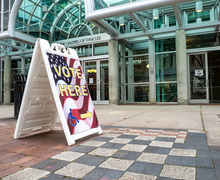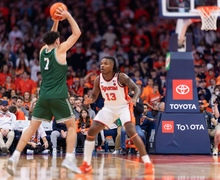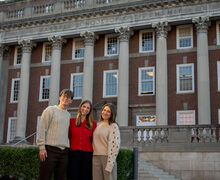Liberal : Public schools must stop challenging religion section of First Amendment
In the past few weeks, school prayer has been challenged in states across the country. Cases in Rhode Island and Florida highlight a misunderstanding between the freedom to express religion and the need to keep schools an area where no religion is promoted or given preference.
A historical ruling of the First Amendment is interpreted to mean public schools are not allowed to offer prayer in school. Private religious expression is protected from government.
A student at Cranston High School in Rhode Island sued the school for hanging a prayer banner in the school. The verdict in the case was delivered and the controversy followed in January and February. The banner contained the phrase ‘Our Heavenly Father.’ The phrase was ultimately removed. Some believed the banner was not offensive and had little to do with religion.
Legislation in the works in Florida brings religion further into the classroom. In Florida, legislation that circumvents the constitutional interpretation is awaiting signing by Gov. Rick Scott. The legislation allows students to lead prayers in mandatory school events. ‘Inspirational messages’ are permitted as long as students organize and deliver them. Faculty may not be involved.
Scott has not made a decision about the bill. When asked if he would sign it, he said ‘I haven’t seen the bill, but I believe in Jesus Christ, and I believe individuals should have a right to say a prayer,’ according to the Orlando Sentinel.
Charles Van Zant, one of the representatives who worked on the bill, claims allowing school prayer is a way to promote morality. ‘Before we removed inspirational messages, the number one problem was talking out of turn,’ he said. ‘Now, it’s drug abuse.’ He believes since the Supreme Court outlawed school prayer, our educational system has been damaged.
Advocates of school prayer, mainly conservatives, believe students’ rights to free expression are being trampled on. By not allowing students to pray, it harms students’ beliefs and may even suggest religion is harmful. Advocates believe religion and prayer benefit schooling.
They believe advances in secular schooling are being fostered by administrators who are being too politically correct or afraid of offending anyone. They also believe students could benefit by being exposed to prayer. Societal problems could be fixed if religion were allowed back into schools.
These ideas, though, are based in an improper understanding of the law and an insistence that because most students are religious, prayer should be allowed. But schools must remain completely neutral to religion. Offering prayer at mandatory events infringes on the rights of students who have no religion or are against religion.
Simply because a minority of students have a religion – nearly 80 percent are Christian in the United States, according to the Pew Forum – does not allow the government to hand off school prayer into the hands of students. Whether students or faculty do so, the end maintains an unbalanced atmosphere.
Perhaps advocates of prayer in schools would not mind equal time being given for messages against religion and in favor of science, rationality and inquisitiveness. They most likely would not agree with this. Reversing the situation this way gives school prayer advocates the opportunity to understand the point of view of the nonreligious. Just because there are so few nonreligious people does not change the validity of their concerns.
Public schools do not exist as a ground for students to express or promote their religious beliefs. Advocates of school prayer see schools in radically different way. Schools are supposed to inform students about the world and to encourage critical thinking – things most religions do not endorse. Churches and private religious schools are places where prayer belongs.
This way, all students may receive equal treatment and the opportunity to decide upon their beliefs for themselves.
Harmen Rockler is a junior newspaper journalism and political science major. His column appears every Monday. He can be reached at horockle@syr.edu.
Published on March 18, 2012 at 12:00 pm





